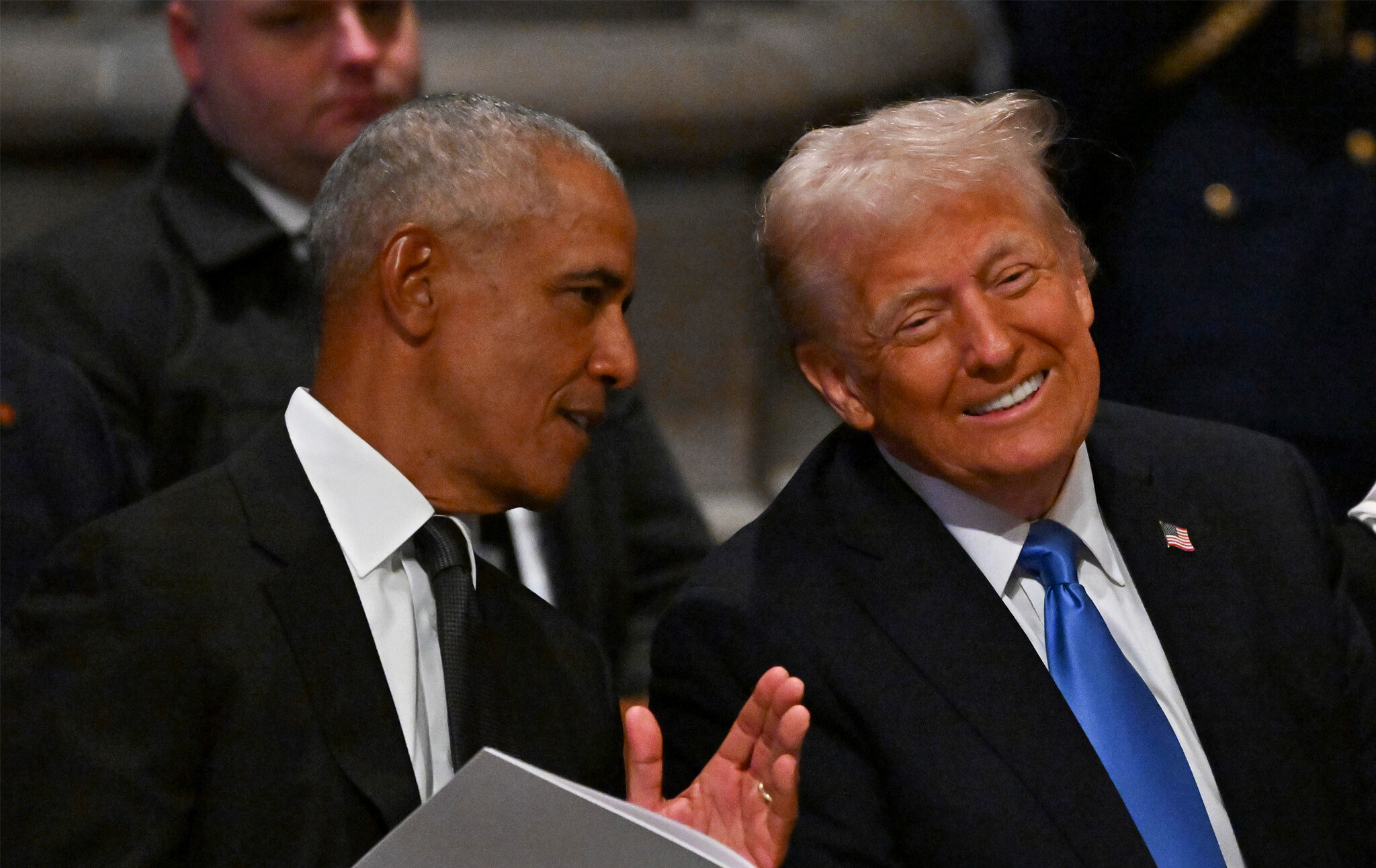
The Party of War Has Two Branches
The Democrats’ foreign policy has been horrifying. The Republican Party’s anti-war posture is a sham. War is not about political parties. It’s the people versus the powerful.
In The Guardian, foreign policy analyst Matt Duss has an excellent and important critique of the Democratic Party’s recent record on militarism and war. Duss argues, correctly, that rather than articulating a vision for world peace and pushing for an end to the wars in Gaza and Ukraine, leading Democrats have embraced military solutions to the world’s problems. Embracing hawks like Liz Cheney and promising the world’s “most lethal” military, Democrats have been “leaning into a tired, curdled militarism as a substitute for an actual foreign policy vision.”
Duss is scathing about Joe Biden, who he says has somehow managed to do “more damage to the so-called ‘rules-based order’ than Trump did,” because America’s blank check support for Israel’s crimes in Gaza “has violated virtually every international norm on the protections of civilians in war and left America’s moral credibility in tatters.” Biden, shunning diplomacy, squandered possibilities for peace in Ukraine and continued the Trump administration’s confrontational stance toward China, worsening the likelihood of an eventual war. Nor did Kamala Harris disavow this appalling record or pledge to do anything differently. (Infamously, she could not think of even one decision Biden made that she disagreed with.)
Nearly everything Duss writes is accurate, although I’d take issue slightly with his uncritical praise of Bernie Sanders’s foreign policy stances given Bernie’s early refusal to endorse a Gaza ceasefire and decidedly mixed anti-war record as a legislator. (Duss is Sanders’ former foreign policy adviser.) Duss sees Sanders as the clear model for an alternative, whereas I don’t think he has been consistent enough. Duss’s article is seriously misleading, though, in its headline: “Democrats have become the party of war.” To be fair, writers tend not to write the headlines of their articles, and in the piece Duss does not suggest the Republican Party is authentically antiwar. But if we are to understand why wars happen and to change American foreign policy, it is vital not to be misled into thinking that one of the two major parties is “the” war party. It is this kind of mistake that led some people to conclude that Donald Trump was actually a “pro-peace” candidate, when, as I pointed out during the election, he is actually just very good at salesmanship and understands that the American public wants to hear promises of peace and good times, not war and misery.
Duss is right that because of Gaza, Biden’s record is actually deadlier than Donald Trump’s. Trump did not fund and arm a major genocidal atrocity and then falsely claim to be trying to end it. But Trump’s record suggests that this is only because the war broke out on Biden’s watch rather than Trump’s. As Elias Khoury has written for this magazine and Ben Norton has documented in an excellent video on Trump’s foreign policy, Trump’s “peace through strength” policy ultimately amounts to the use of threats of violent coercion, which is why Trump ripped up nuclear arms control measures and expanded the nuclear arms race with Russia and China. Trump is already threatening a new age of imperialism, musing about starting a war with Denmark to seize Greenland. Trump’s foreign policy team is already weighing the possibility of launching a joint attack on Iran with Israel. Trump is, if anything, even less likely to pressure Israel to make any concessions to Palestinian human rights (such as the modest quantities of aid that Biden meekly requested Israel provide). He has promised to set the pro-Palestine movement back 25 or 30 years, pledging a major crackdown. Trump may be less likely to engage in dangerous nuclear brinksmanship with Russia than Biden is, but as the Arms Control Association documents, Trump’s confrontational stance toward China threatens to make the possibility of nuclear war between the two countries much likelier:
Following President Donald Trump’s reelection, China anticipates a more confrontational U.S. policy and is bracing for intensified strategic competition. Beijing is likely to double down on bolstering its nuclear arsenal, emphasizing the Chinese military Rocket Force mission of “strategic counterbalance,” the use of strategic military capabilities to moderate adversaries’ broader approaches toward China. During Trump’s first term, the Chinese leadership came to view the United States as an existential threat, not primarily due to changes in U.S. nuclear policy but because of a severe deterioration in bilateral relations broadly. This has driven Beijing to rely increasingly on the perceived coercive power of nuclear weapons to stabilize its overall relationship with Washington. … The Trump administration appears prepared to advocate for the expansion of tactical nuclear capabilities, believing that perceived weaknesses in this area could embolden China to consider nuclear first use in a regional conflict. … Chinese military analysts are focused predominantly on what they see as a growing U.S. interest in lowering the nuclear threshold and preparing for limited nuclear wars.
In other words, Trump in his first term caused a nuclear-armed power to view this country as an “existential threat.” It should go without saying that it is very dangerous to have a country with nuclear weapons think of your country as a major threat. “Peace through strength” amounts in practice to trying to terrify the rest of the world with constant threats of extreme violence, but those who are afraid of U.S. nukes might make efforts to counter the threat (like the Soviets did by putting missiles in Cuba) that lead to a confrontation that could end human civilization as we know it.
MAGA Republicans know that in the wake of the Iraq war, Americans have little appetite for new wars abroad. There is a kind of “Iraq syndrome” that echoes what was called “Vietnam syndrome,” the reluctance to support the use of military force after seeing what a horrible catastrophe the war on Vietnam was. But Trump is still a militarist who does not believe in cooperating with international institutions and sees threats of force as a legitimate tool in international affairs.
In that respect, he’s not much different from other U.S. presidents of both parties. As Noam Chomsky and I documented in The Myth of American Idealism, since World War II all United States presidents have brazenly violated international law and chosen the maintenance of U.S. global dominance over the possibility for a peaceful, sustainable future. (In Chomsky’s phrase, they have chosen hegemony over survival.) There are certainly differences among the presidents. Barack Obama, for instance, pursued greater openness toward both Cuba and Iran, policies that Trump reversed. Biden made no effort to restore Obama’s sensible diplomatic measures. But the similarities are often more important than the differences. Jimmy Carter, for instance, is known as a “human rights” focused president who supposedly repudiated U.S. support for horrific dictatorships. The real story is less impressive. When the 1979 Iranian revolution, for instance, unseated the brutal pro-U.S. dictator we had installed in power in 1953, the Carter administration tried their best to preserve the Shah’s rule. Frustrated by the fact that the Shah had not “been willing to order massive bloodshed” in order “save his own ass,” the Carter administration tried to engineer a coup, but Carter did not “recognize that the Iranian generals were as hesitant as the monarch they had served and had no stomach for a crackdown.” Preserving a U.S.-allied government was much more important than respecting the wishes of the Iranian people, just as had been the case in 1953.
American foreign policy is made by a small group of elites who have little regard for the interests or desires of the U.S. population and attempt to manipulate public perception in order to obscure the human costs of our policies. (If that statement seems extreme, I recommend reading Myth, which I believe contains irrefutable evidence showing this view to be correct.) It is important to understand that the structure of the political and economic systems, which are highly unequal, has much more to do with policy than the personal inclinations of individual presidents. U.S. support for Ukraine, for instance, is much better explained by the fact that such support helps revitalize the U.S. arms industry (which has an insidious influence on policy and a revolving door in the government) than by the idea that Joe Biden simply gets misty-eyed at the thought of children dying in war and is trying to do something to help. (He certainly sheds no tears for the Palestinians.)
A clear-eyed analysis requires us to look much more at these consistent, enduring features of the American government than on particular political parties. I am not downplaying the differences between the parties. I think the Republican agenda is utterly horrifying. But I am mindful of what Bertrand Russell wrote over 100 years ago, in 1923:
One of the peculiarities of the English-speaking world is its immense interest and belief in political parties. A very large percentage of English-speaking people really believe that the ills from which they suffer would be cured if a certain political party were in power. That is a reason for the swing of the pendulum. A man votes for one party and remains miserable; he concludes that it was the other party that was to bring the millennium. By the time he is disenchanted with all parties, he is an old man on the verge of death; his sons retain the belief of his youth, and the see-saw goes on.
Many of us have not fully internalized Russell’s insight even after a century. I don’t think he was saying that there are no differences between the parties, but rather that the most fundamental causes of human misery are deeply structural and the major existing parties are committed to maintaining those structural features. If we think there is a party of war, then we are as foolish as anyone who voted for Richard Nixon because they opposed Lyndon Johnson’s Vietnam War, or who believed Woodrow Wilson’s slogan “He Kept Us Out of War" (technically not a lie, people should have wondered why it was not “He Will Keep On Keeping Us Out of War”). Trump’s “anti-war” posture is just as much of a con as his fake university or his fake charity. It would be nice if one party could be relied upon to oppose war, but in the world we live in, the choice between Democrats and Republicans on foreign policy amounts to something close to: “Would you prefer more warmongering against Russia or more warmongering against China?” The answer “I would like neither” is not on the table in our two-party system. To have antiwar, antimilitaristic ideals actually embodied in U.S. policy, we will have to build a much more equal country in which the interests and desires of the population at large are actually represented by those in government. We are far away from having such a system.






